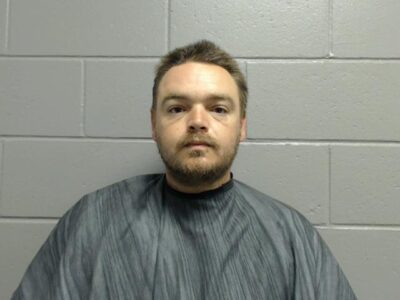Multiple motions were denied to a Murrayville man accused of murdering another in Nortonville almost four years ago.
38-year-old Kenneth J. Acree appeared before visiting Judge Ryan Cadigan on Friday for several pretrial motions, one of which is under a recently enacted state law.
Acree was seeking release under the new Pretrial Fairness Act under the SAFE-T Act that went into effect in September of last year. Acree had been held under the old cash bond system with bond set a $1.5 million, 10% to apply since October 2020 when he was arrested for the shooting death of Robert J. “Joey” Schofield. Judge Cadigan warned Acree prior to arguments that if he wished to seek pretrial release under the new system, he could not go back to the old system in order to post bond and be released.
Acree’s defense attorneys W. Scott Hanken and Daniel Fultz then argued on his behalf that he had no prior criminal history before the events leading up to Schofield’s death and had demonstrated good behavior while incarcerated at the Morgan County Jail. They also argued that Acree acted in self-defense in Schofield’s shooting death under a very specific set of circumstances, which would pose no threat to the community.
Morgan County State’s Attorney Gray Noll says that Acree’s actions afterwards, which he says attempted to thwart justice and create what’s called “willful flight” should keep him behind bars until a trial is completed: “Ultimately the court granted the people’s verified petition to deny the defendant pretrial release, ruling that there was a substantial likelihood that the defendant committed the offense and that by clear and convincing evidence the state proved that he potentially poses a real and present threat to the safety of a specific individual or the community at large.”
Noll also says that by Acree allegedly hiding Scholfield’s body, lying to police for several days, while helping to search for his body, showed there were no set of conditions that the court could impose that would mitigate the threat he posed.
Several other motions surrounding evidence being presented at a potential trial were also denied including a motion that would have prohibited the state from calling Schofield a victim during the trial, character evidence surrounding Schofield allegedly being a volatile, misogynistic individual who always carried a gun and having violent tendencies.
Assistant State’s Attorney Chad Turner, using Illinois case law, argued that the items in the character evidence motion were not specific and didn’t specify noted volatile or violent acts that may or may not have occurred leading up to Schofield’s death. Noll says the state believes that the character evidence is untrue: “There was a variety of evidence, as Mr. Turner stated in his argument, that the defendant was trying to present but that the state vehemently denied. We felt that a lot of things mentioned in court by the defense counsel simply aren’t true. The specific motion in limine dealing with the vast majority of this character evidence was denied, which means that the defendant wouldn’t be allowed to introduce the type of evidence he was attempting to. From the state’s position, they wouldn’t have been able to lay the proper foundation regardless of the ruling on this motion.”
Though most of the character evidence was denied, Judge Cadigan said on Friday that if the proper foundation were laid, some of it may be allowed during trial.
One motion that was tabled on Friday was that the defense has asked for funds to hire an expert witness to testify about ballistics that would aid in their self-defense argument, which has caused a continuance in the case. Noll says that the expert testimony may be agreed upon beforehand: “There were some motions asking that the court release some funds to hire experts in the area of firearms, that obviously necessitates a continuance, you know, a longer period of time for trial for the defendant to hire that expert and get some sort of report from that expert.”
On the subject of the Illinois police doing the same for the state, Noll says: “It depends on what their evidence is, right? As I stated on the record, it’s possible that whatever they are hiring this expert to say, it’s possible we would just be able to stipulate to it. Their motion did not go into specifics of what they want this expert to testify to but ultimately the state will get that and we’ll know in advance.”
A potential trial date has been set for May 21st.




